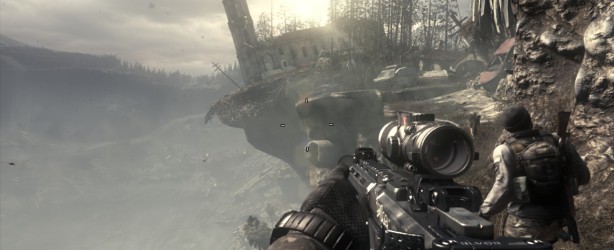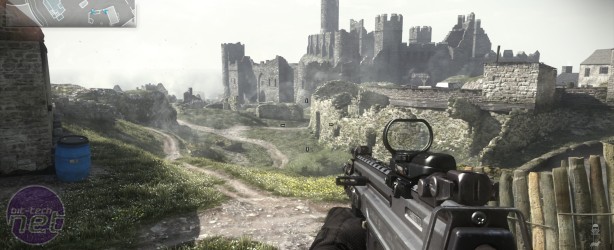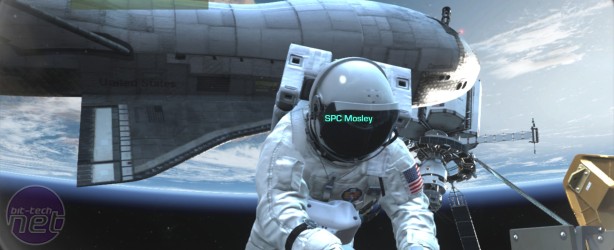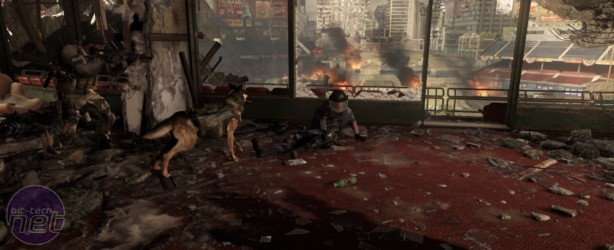
Call of Duty: Ghosts Review
Developer: Infinity WardPublisher: Activision
Platforms: PC, X360, PS3, PS4, Xbox One
Price: £39.99
Reviewing a Call of Duty game is a little like reviewing your fridge every twelve months. You know exactly what it does, and while you may not be able to recall precisely what's inside, you can probably hazard a fairly accurate guess. You know there's going to be a bottle of milk, a couple of beers, and a few putrefied mushrooms you should have thrown out days ago. Occasionally you'll discover some delicious bacon that you'd forgotten about, but more often it's a pot of low-fat yoghurt that's been left so long it resembles low-fat cheese, or a box of eggs that really doesn't need to be in there.
So it's no surprise that, despite advertisement claims of being "The most ambitious Call of Duty yet." Ghosts is precisely what you'd expect; a bombastic yet strangely bland campaign dangling off the end of a beefy yet rote multiplayer mode. It is milk, beer and mushrooms, with a strong whiff of cheese and only the merest hint of bacon.
In fact, the only truly significant difference between this and the previous Call of Duty titles is that Ghosts treats itself to a brand new fridge. Being a cross-generational game, Infinity Ward have finally decided to upgrade their IW Engine, serving it with all the technological trimmings. The PC version, which we reviewed, comes weighed down by a whopping 60-ish Gigabytes of HD textures, while acronyms such as HBAO and TXAA abound in the graphics options. The result is that visually Call of Duty now rivals the likes of the Battlefield and Crysis series'.
The campaign certainly makes the most of this additional graphical fortitude. Its wildly varying locations are beautifully rendered, ranging from snow-blasted mountain fortresses, to flooded cities, dense jungles, dazzling underwater landscapes, and even the vast emptiness of space. The game's trademark action sequences are also more intense than ever. Almost every level involves something enormous either crashing, crumbling, or exploding, flinging PhysX enhanced debris in all directions like deadly confetti.
Alongside varied settings, each mission brings with it unique weapons or mechanics. The flooded city, for example, essentially enables you to use the waist-deep water as cover, helping you avoid the aim of enemy soldiers, while literally drowning out the sounds of the battle around you. Another particularly strong mission involves infiltrating a skyscraper to interrogate a heavily guarded enemy agent, and involves frequent use of rappel lines. Here you fight horizontally, vertically, upside-down and inside-out. The underwater and space missions are also enjoyable. Their slower pace, muted sound and eerie surroundings result in an experience that is tense rather than intense, and because of this they're probably the best missions in the entire game.
But the game's strongest feature, variation, is also its biggest problem. Like all the Call of Duty's over the last four years, the campaign has a dotted, staccato rhythm that never gives you a chance to settle. Furthermore, nearly all its more interesting mechanics are entirely disposable. For example, early in the game you can order your pet dog Riley to attack enemy soldiers. But Riley is present for three missions and is never directly involved again. Similarly, one mission set in a dilapidated stadium features a remote sniper-rifle that can be accessed and fired from anywhere on the map, but it is only available for that one mission, which is such an enormous waste.
The result is Ghosts' campaign feels like a series of concept demos for more interesting games, rather than a cohesive product in its own right. Of course, what's supposed to be binding everything together is the gunplay, but as an FPS Call of Duty has become markedly mediocre. It's the world's most expensive fairground shooting gallery. Both the actions of the player and the AI are prescribed to the point where you can spend half the game letting your teammates do all the work for you, and when you are eventually required to shoot at something, there's nothing kinetic about it, no challenge beyond how quickly you can knock the targets down.
These problems have been inherent in Call of Duty for ages, and with each passing year they become increasingly acute, especially when there are wonderfully dynamic FPS' like Far Cry 3 around. And it isn't like there's a compelling story to salvage it either. The setting is admittedly more interesting, moving away from the grim realities of Modern Warfare into near-future fantasy where the US is a downtrodden underdog and so can feasibly be heroic again. But with the exception of the first three missions, this has zero impact on how the game actually plays.

MSI MPG Velox 100R Chassis Review
October 14 2021 | 15:04













Want to comment? Please log in.